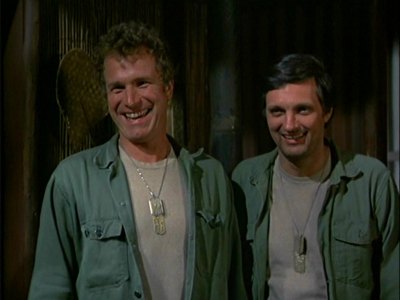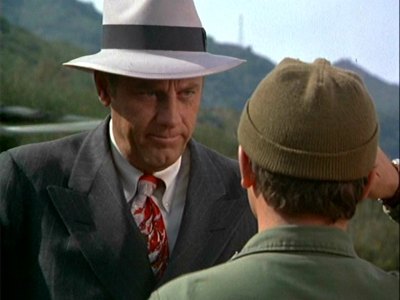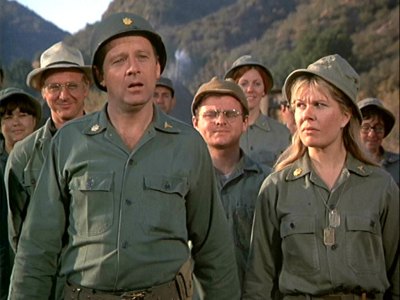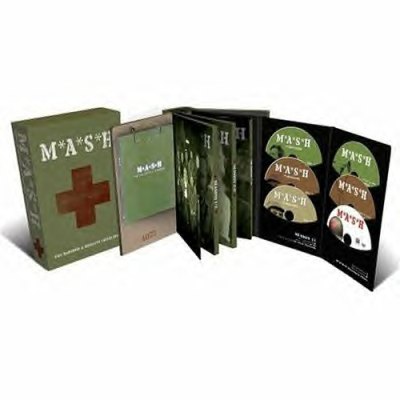| Reviews & Columns |
|
Reviews DVD TV on DVD Blu-ray 4K UHD International DVDs In Theaters Reviews by Studio Video Games Features Collector Series DVDs Easter Egg Database Interviews DVD Talk Radio Feature Articles Columns Anime Talk DVD Savant Horror DVDs The M.O.D. Squad Art House HD Talk Silent DVD
|
DVD Talk Forum |
|
|
| Resources |
|
DVD Price Search Customer Service #'s RCE Info Links |
|
Columns
|
|
|
M*A*S*H - Martinis and Medicine Complete Collection
Wow. I've spent the last three weeks immersing myself in the M*A*S*H: The Martinis & Medicine Collection, and I must say that it was a surprisingly heady experience for me. I was seven when the show premiered in 1972, and almost eighteen when it ended in 1983. I grew up with M*A*S*H being one of the most talked about and watched TV shows during those influential years, and I was rather taken aback at the flood of memories and feelings I've had during this month, reviewing this mammoth box set. I can remember sitting down next to my old man on the couch, watching the first, funniest years of the show (his favorite episodes from the series, as well as mine and many other fans). And I remember going over to the house of this girl I was crazy about in high school, where she threw a "Farewell M*A*S*H" party for the celebrated Goodbye, Farewell, and Amen final episode (the party started out with a lot of anticipatory laughs, which were quickly extinguished by the serious, sad parting episode). Watching all these episodes, I realized what a big part of my TV viewing experience they comprised, and how many other memories were associated with watching them over the years.

During the first four or five years that M*A*S*H originally aired, I never missed the show. After some significant cast changes, and a discernable shift in the series' tone, I would view it more sporadically, checking in occasionally to see how the venerable show was doing. I can't say I was a fan of the very last few years' episodes; the show had become a little too strident in its various social and political messages, while its comedy had become too rote and forced for my tastes. But still, when the final Goodbye, Farewell, and Amen episode aired, I felt a sense of loss (as I'm sure many viewers did) when a show I had grown up with, finally ended. As with all great TV shows, M*A*S*H insinuated itself with viewers, becoming as much a valued visitor into their homes as relatives and loved friends. It didn't particularly matter to me that the show in later years didn't especially appeal to me; like a friend who's been with you for years, the actual years together count just as much as any other aspect of the friendship.
When I was a kid, the original film version of M*A*S*H (gratefully included in this box set) was generally considered the raunchiest, funniest film released up to that point (I would imagine Blazing Saddles took away that title a few years later). It was one of those films that your parents would laugh about, on the q.t., when you started to listen a little too closely to what they were recounting. So I remember being quite excited about the TV series starting in 1972. I was sophisticated enough in the ways of TV, even at that early age, to know that nothing remotely objectionable would be broadcast on a network series (how times have changed, haven't they?), so this was my chance to see maybe a glimmer of what my parents were quietly snickering about. And I wasn't disappointed - nor were they. Contributing many of the first four years' wittiest scripts, veteran comedy writer Larry Gelbart (Your Show of Shows, A Funny Thing Happened on the Way to the Forum) set the tone for the rest of the series, expertly mixing pointed social criticism with some of the best one-liners this side of Woody Allen. The first three years' worth of episodes of M*A*S*H are amazingly adept little satires, sometimes overtly silly (Five O'Clock Charlie), sometimes surprisingly deep (Sometimes You Hear the Bullet). Aided by a stable of other writers and directors working on the same wavelength, Gelbart and frequent director Gene Reynolds crafted, week after week, episodes that are still considered the series' best.
After a shaky first year in the ratings, where the show was almost canceled, a move to CBS's still-legendary 1973 Saturday night line-up (All in the Family, M*A*S*H, The Mary Tyler Moore Show, The Bob Newhart Show, and The Carol Burnett Show) catapulted the series into the public's consciousness, and firmly affixed the cast into people's affections. Alan Alda's and Wayne Rogers' roguish charm and beat-perfect comedic timing were expert foils for the supremely gifted Larry Linville's creation: the weasely, paranoid, possibly insane Major Frank Burns. Gary Burghoff continued his Radar O'Reilly character over from the feature film (a character who oddly started off as knowing, but gradually became more naive as the series progressed), while Loretta Swit proved to be simultaneously sexy and funny as the rigid, yet smoldering, Major Margaret Houlihan. William Christopher was delightfully square and compassionate as Father Francis Mulcahey, and the addition of Jamie Farr in 1973 added an element of the surreal to the proceedings with the cross-dressing, Section 8-seeking Corporal Max Klinger. And watching over all of this was the commanding officer of the 4077th, Lieutenant Colonel Henry Blake (McLean Stevenson). Stevenson's mid-Western appeal, combined with an endearingly bumbling, sweet (yet still philandering and hard drinking) take on the character, really rooted the comedy during these three years. For a show that was decidedly anti-authority, despite Hawkeye's and Trapper's disregard for Henry's leadership skills, Stevenson was still able to impart the necessary audience anchor for the show's wild and wooly antics (an anchor that the producers obviously felt was still needed when Stevenson left, putting in solid, regular-Army character Colonel Potter in Blake's place).
So it came as a great shock when the show's producers killed off Henry Blake at the end of the third season. Here was a character that the American public had come to really love (certainly of all the characters on the show over the years, his was the most loveable). And he was killed off, right when the public expected his departure from the 4077th to be sad, but ultimately happy one. Just like that -- dead. Of course, that's the reality of war, and for my money, M*A*S*H never again achieved the purity of that message than in that stinging moment when Radar comes into the operating room, and announces Henry's death. It's also perhaps the series' only real true tragedy behind the cameras, as well. Stevenson, whether on bad advice from his own handlers, or going by his own thinking, fatally crippled his career when he left M*A*S*H for a long term contract with NBC. He left a celebrated part he could have conceivably played for the next eight years (no doubt eventually receiving the accolades he deserved for his acting) to star in garbage like The McLean Stevenson Show, Celebrity Challenge of the Sexes and most notoriously, Hello, Larry.

Equally disconcerting was the premiere episode of the fourth season, where we learn that Trapper John has also left the show. Wayne Rogers, tiring of his increasingly second-banana role to Alda (the facts of his departure are still shadowy), quit the show over the summer of 1975, and was unceremoniously dispatched, without even a final goodbye scene to the audience. Many fans and critics talk about the famous Henry Blake departure, which unfortunately seems to have overshadowed the shabby way Trapper was dismissed from the series. Rogers, an extremely ingratiating performer, had a solid lock on the Trapper role, taking a character that could have been a shadow next to the central Hawkeye role (especially since the writers were skewing towards Alda's Hawkeye), and making it his own with a combination of that ever-so-slight Alabama twang, and an alternating cocky/laid-back way with his delivery. Although Rogers didn't have the career troubles that Stevenson had after leaving the show (he's a power player on the financial scene), his absence, along with Stevenson, was felt by loyal viewers who had come to see the cast of M*A*S*H as a family.
I never warmed to Roger's replacement, Mike Farrell. As B.J. Hunnicut, the relatively bland Farrell, in my mind, was specifically picked to stay firmly behind Alda (something Rogers obviously wasn't willing to do). While a competent (but unexciting) actor, Farrell always seemed uneasy delivering the rapid-fire quips that Rogers would have tossed off with ease. Nor did it make sense to have the devoutly married family man Hunnicut often referred to, along with Hawkeye, as a some kind of rake with the nurses (Hanky Panky, Movie Night). The inclusion of Harry Morgan as Colonel Sherman T. Potter was a far more successful addition to the cast. Morgan, a veteran of decades of movie and television show appearances, struck just the right note as the by-the-book, regular Army commanding officer, who at the same time was understanding and tolerant of the shenanigans going on at the 4077th.
And while I enjoyed David Ogden Stiers as the stuffy, haughty, brilliant Major Charles Emerson Winchester, he was no substitute for Larry Linville's hilariously twisted Major Frank Burns. Following the departure of Stevenson and Rogers at the start of the fourth season, Linville had two more years of playing Burns, and his marvelously psychotic portrayal helped keep the original tone of the show during those transition years. Unfortunately, he wasn't given a farewell episode, either, with his last, desperate acts in Tokyo to find his paramour Margaret, only relayed to the audience via telephone. It was another makeshift, disrespectful ending for a beloved character.

With Linville's departure, much of the original madcap spirit of the show left, as well. At that point, I can remember tuning out from M*A*S*H on a more and more regular basis. Gelbart had left after the fourth season, with director Gene Reynolds gone after season five. Frequent contributor Burt Metcalfe became the defacto director of the series, with Alda taking a more central role in producing, writing and directing the series, as well. Comedy was becoming much more subordinate to the drama on M*A*S*H now; the "message" -- whether it was women's liberation, the horrors of war, the various personal foibles of Hawkeye Pierce (and to a lesser extent, the other characters) -- became king. The satirical nature of criticizing American military efforts - and later by extension, the American government and various aspects of American life and culture in general - became more pronounced, and less affectionate in the ribbing. M*A*S*H was quickly turning into a political screed that became less and less an enjoyable entertainment, and more and more a weekly lesson and lecture that I didn't need to hear over and over again. The repetition of the messages - war is bad; American culture is faulty; men are screwed up in comparison to women - quickly reached the saturation point, and made tuning into the series, frankly, a trial. While I don't question the sincerity of the artists who firmly held those beliefs (no matter how one-sided and biased they are), nor the artistry of the established (and eventually overused) form that was utilized to get those beliefs across, M*A*S*H gradually evolved into overkill, its best messages delivered years before the final fadeout.
The best example of this was probably the final episode, Goodbye, Farewell, and Amen, a hodgepodge of disparate storylines (there were way too many writers working on the script for any semblance of cohesion) that illustrated all too clearly the show's artistic dead end. How many times had we already seen Hawkeye pushed to his psychological limits? The catalyst for his actual breakdown (a breakdown that included almost botching an operation, which unfortunately Alda failed to show the audience) - a mother smothering her infant to keep it quiet when a North Korean patrol goes by - works more as a gimmick to illustrate Hawkeye's problems, rather than a stand-alone, horrific event (it's also very similar to a plot development in the WWII film, The Counterfeit Traitor, where Klaus Kinski smothers himself to keep quiet as a German patrol searches for some escapees). How many times had we seen Winchester bemoan the cultural desert that was the 4077th? How many times had we seen Father Mulcahy go above and beyond for the orphans down the road? And on and on. Clumsy script construction led to an awkwardly shot episode that had little flow from storyline to storyline, with the seams of the various individual scriptwriters' vignettes all too visible. Goodbye, Farewell, and Amen may still hold a record for Nielsen ratings, but it's a rather weak episode that indicated the series was long overdue for saying goodbye. Still, taken as a whole, M*A*S*H was a remarkable artistic achievement that helped pushed the boundaries of traditional TV fare, while entertaining millions of loyal fans all over the world throughout the 1970s, and for the next two decades in its umpteenth syndicated reruns.
The Collection:
Let's look at the M*A*S*H: The Martinis & Medicine Collection box set. First and foremost, I know there are a lot of very unhappy M*A*S*H fans out there who feel 20th Century Fox essentially ripped them off by previously releasing the eleven seasons of M*A*S*H on disc - with no extras - only to bundle all of them together for this M*A*S*H: The Martinis & Medicine Collection, which includes a fair amount of extras, at an overall lower price than purchasing the individual sets. Fair enough. I bought the previous first three seasons on DVD, as well, because I wanted them when they came out. Of course, buying as many DVDs as I do, I knew that eventually, they'd come out with a box set of the whole series - as they do with almost any TV show now. That's the reason I haven't bought any Andy Griffith shows on DVD - they're eventually going to come out with a huge box set, with plenty of extras. And if they don't, you'll still be able to pick up the individual sets on Ebay if they go out of print. So I can certainly understand customers' outrage. But honestly -- you had to know they were going to do this to you.
Now, to make you feel better; if you bought the individual discs and now you're kicking yourself that you have to shell out another $200 bucks to get the extras and the cool box -- relax. I'm not going to recommend you purchase M*A*S*H: The Martinis & Medicine Collection. While I know diehard fans will want those extras, they're not anything spectacular, with most of them already appearing on television (and there's a good chance Fox is going to release them separately anyway, after all the stink about this collection). The quality of the transfers - a problem from the get-go not because of the DVD process, but because the original source materials have been overprinted to the point of damage - has not been corrected for this box set, so the discs you already have are exactly the same as these. And as for the cool box, it's a royal pain in the ass that by its very construction, may damage the discs included. There -- feel better?
The DVDs:
The Video:
As noted before by other reviewers and customers, the full screen transfers for M*A*S*H: The Martinis & Medicine Collection are exactly the same as the discs used in the previous seasons' releases. The older episodes have a ton of dirt, scratches, and occasional color washes and faded out blacks. The later shows look better, probably because there wasn't as much demand for their source materials during syndication.
The Audio:
The Dolby Digital English mono accurately represents the original broadcast presentation. There's also Spanish and French mono tracks available, as well as English and Spanish subtitles available. There is an option available to leave out the laugh track on the audio when watching the episodes, if you prefer. As the series progressed, there was a concerted effort to get rid of it, so it's barely there in the later seasons, anyway. I've always thought the laugh track as a production tool gets a bad rap, but if it bothers you, you can zap it here on these discs.
The Extras:
Here are the additions to the M*A*S*H: The Martinis & Medicine Collection that have all of the fans up in arms. While some of the extras are indeed new, many have been previously released. As well, some of the so-called "new" featurettes are comprised of elements already aired, so that "new" label may be a little misleading. First and foremost, the original Robert Altman-directed classic, M*A*S*H, starring Elliott Gould and Donald Sutherland, is included in the box set. Some of the extra features that were found on the now out-of-print Five Star Collection edition of this film, are found here, including the Robert Altman commentary track, the AMC Backstory segment on the film, a trailer, and a still gallery. Unfortunately, excessive repeated viewings of this classic have dulled me to it, but for newcomers, it's a breathlessly funny film, and should, ideally, be watched before you delve into the TV series.
On Disc 2 of the special features is the M*A*S*H: 30th Anniversary Reunion special that ran on Fox television in 2002. Mike Farrell hosts, and it runs 86 minutes. Next up is a Fan Base featurette, presumably shot in 2006, which basically has super-fans recounting various episodes. I've never had much use for these specific kinds of fan-based docs; if you're enough of a fan to buy a $200 box set of a series, you already know what's great about the show. You don't need another fan telling you the same things. Plus, some of the commentary on this borders on the truly strange. It runs twenty-five minutes. Next up is the 1991 documentary, Memories of M*A*S*H, hosted by Shelley Long. It runs 68 minutes, and has popped up on TV from time to time since then. And finally, there's a unproduced script, written by Alan Alda from 1972, for an episode that would have been called Hawkeye on the Double. The producers of the disc have made it easy to read the script (usually, these text graphics are too small to actually read), but how it would have turned out is anybody's guess.
The Packaging:
Now for the packaging. While the initial impression made by the M*A*S*H: The Martinis & Medicine Collection is quite imposing, the actual execution is decidedly lacking. Tucked into a khaki green, flocked-material folder slipcase, the actual folder holding the discs is a cumbersome, ungainly construct. The front inside cover has an expensive-looking clipboard (like Radar's) that holds the M*A*S*H: The Collector's Handbook, edited specifically for this collection. Frankly, it's a curious read to be included in an expensive box set. With text excerpted from Suzy Kalter's The Complete Book of M*A*S*H, the booklet essentially calls into question the artistic validity of the second half of the series, while naming names as to who might be the main culprits in this decline. That's a curious note to strike for a pricey box set you want people to buy. It's a glossy little book, with a lot of good pictures, with a complete episode list, with plot description, writer and director credits, and original air dates.

The discs are housed in four large fold-out cardboard sleeves, that hold nine discs each. Not only are the cardboard sleeves difficult to fold out (they're bound in the folder very tightly), but getting the discs out is next to impossible. The slits that were cut into the rough-edged cardboard are going to scratch the discs. Period. Why this method of storage was used is beyond me - especially when you're asking people to shell out all that dough. If you do purchase the box set, I recommend getting some clear plastic holders for the discs, and remove them immediately from their cardboard sleeves. Which of course begs the question - why buy the box set in the first place?
Final Thoughts:
For those of you who have already bought the M*A*S*H discs, you don't need to buy the M*A*S*H: The Martinis & Medicine Collection box set -- unless of course, you want the extras. I've already seen many of the extras included in this set appear on television, and without any commentaries for individual episodes, the extras' appeal is limited. If you haven't bought any of the previous discs, I would recommend you buy the M*A*S*H: The Martinis & Medicine Collection, just for the fact that it's a convenient way to collect the whole series in one fell swoop. However, be forewarned: high-def DVDs are coming (and if they don't prove to kill the standard DVD, some other form of media will come along and do it). So don't be surprised in the next few years that another M*A*S*H box set will be released (probably with those commentaries you just know they've already taped). The question is: do you want to wait, or do you want to enjoy the show now? Life's too short, as far as I'm concerned, so if you're a fan of the show, buy the M*A*S*H: The Martinis & Medicine Collection. It may be poorly assembled, but the entire series is here, along with the movie that inspired it, and it offers literally hundreds of hours of quality TV entertainment to the buyer -- for any M*A*S*H fan, it would be a smashing Christmas present under the tree. Therefore, I highly recommend the M*A*S*H: The Martinis & Medicine Collection.
Paul Mavis is an internationally published film and television historian, a member of the Online Film Critics Society, and the author of The Espionage Filmography.


|
| Popular Reviews |
| Sponsored Links |
|
|
| Sponsored Links |
|
|
| Release List | Reviews | Shop | Newsletter | Forum | DVD Giveaways | Blu-Ray | Advertise |
|
Copyright 2024 DVDTalk.com All Rights Reserved. Legal Info, Privacy Policy, Terms of Use,
Manage Preferences,
Your Privacy Choices | |||||||














